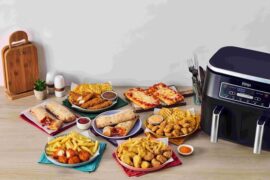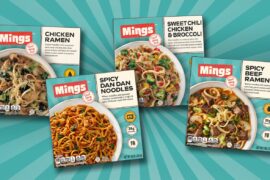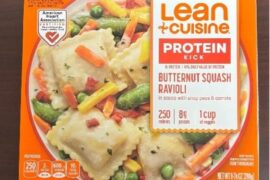An upturn in its frozen food business in North America was among the high points in Nestlé’s sales results for the first nine months of the year, when total group revenue fell 2% to CHF 64.9 billion. Organic growth during the period was posted at 4.2%, while real internal growth was 2%.
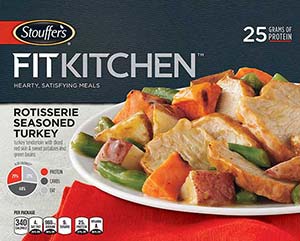 The Vevey, Switzerland-headquartered multinational food, beverage and consumer care products company reported that the relaunch and repositioning of Lean Cuisine and Stouffer’s brand ready meals and side dishes in the USA and Canada gained further traction. Its new Lean Cuisine Market Place and Stouffer’s Fit Kitchen ranges have delivered growth for several months now, outpacing the market and driving recovery in the frozen meals category.
The Vevey, Switzerland-headquartered multinational food, beverage and consumer care products company reported that the relaunch and repositioning of Lean Cuisine and Stouffer’s brand ready meals and side dishes in the USA and Canada gained further traction. Its new Lean Cuisine Market Place and Stouffer’s Fit Kitchen ranges have delivered growth for several months now, outpacing the market and driving recovery in the frozen meals category.
Elsewhere in the frozen food aisles of North America, Nestlé pizza brands gained momentum and new ice cream products delivered solid growth paced by sales of Häagen-Dazs premium products and Outshine Fruit Bars.
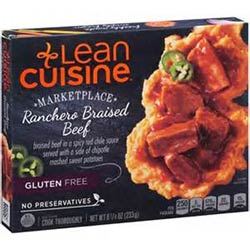 With overall sales in the Americas up 6.2%, the company’s output at flagship plant facilities in Solon, Ohio is reportedly at full throttle producing Lean Cuisine and Stouffer’s ready meals products. Increased demand and further gains are anticipated for 2016.
With overall sales in the Americas up 6.2%, the company’s output at flagship plant facilities in Solon, Ohio is reportedly at full throttle producing Lean Cuisine and Stouffer’s ready meals products. Increased demand and further gains are anticipated for 2016.
“We did a lot of work in order to renovate, repackage, reformulate, reposition our frozen food franchise, and we are happy to see that the results are coming,” said Francois-Xavier Roger, chief financial officer and executive vice president of Nestlé during a call with financial analysts. “We have been positive for seven months in a row now, month on month in growth for the frozen food business in the US, and if we look at the third quarter of the year, we were a positive and even high single digit in growth against the same period of last year.”
Europe Turnover Up 4%
In Europe group sales rose 4%, thanks in part to an increase in ice cream sales during a relatively hot summer. At the same time, frozen pizza also sold well.
Earlier this month Nestlé announced that it is in advanced discussions with R&R, a leading ice cream manufacturer headquartered in the United Kingdom, to set up a joint venture. The arrangement would have Nestlé contribute its ice cream businesses in Europe and four other countries, and its European frozen food business, excluding pizza, to the merged enterprise. The proposed joint venture is designed “to bring together the complementary strengths of each company and create a leading player in ice cream,” Nestlé said in a press release.
Maggi Noodle Food Safety Scare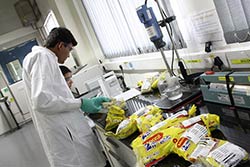 Negatively impacting the bottom line was the Maggi noodle food scare in India, which forced Nestlé to withdraw and destroy approximately CHF 47 million worth of product. In China, the sales recovery has been slower than hoped for, and globally the strength of the Swiss franc against currencies in selling markets reduced total turnover value by 6.7%.
Negatively impacting the bottom line was the Maggi noodle food scare in India, which forced Nestlé to withdraw and destroy approximately CHF 47 million worth of product. In China, the sales recovery has been slower than hoped for, and globally the strength of the Swiss franc against currencies in selling markets reduced total turnover value by 6.7%.
Nestlé was forced to remove its popular Maggi noodle products from store shelves in India last June because of safety concerns after laboratory tests were said to have show that samples contained large amounts of lead, a heavy metal. The recall was one of the largest ever in India’s food sector.
After appealing the product ban, a favorable decision was handed down by the Bombay High Court, which declared the government-imposed prohibition was “arbitrary” and had violated the “principles of natural justice.”
Nestlé has always insisted that the product line is safe, and results of a third laboratory test released last week would seem to confirm the company’s stand. It is now actively engaging with authorities to get Maggi noodles back into retail distribution channels.
CEO Projects 4.5% Full-Year Growth Rate
“After a good performance in the first half of the year, we were impacted in the third quarter by exceptional events, with Maggi noodles in India and a rebate adjustment in Nestlé Skin Health. Yet our real internal growth increased, reflecting broad-based positive momentum across our business and many of our markets,” said CEO Paul Bulcke. “On the whole, organic growth fell short of our expectations and therefore we project organic growth of around 4.5% for the full year, with improvements in margins and underlying earnings per share in constant currencies, and capital efficiency.”


